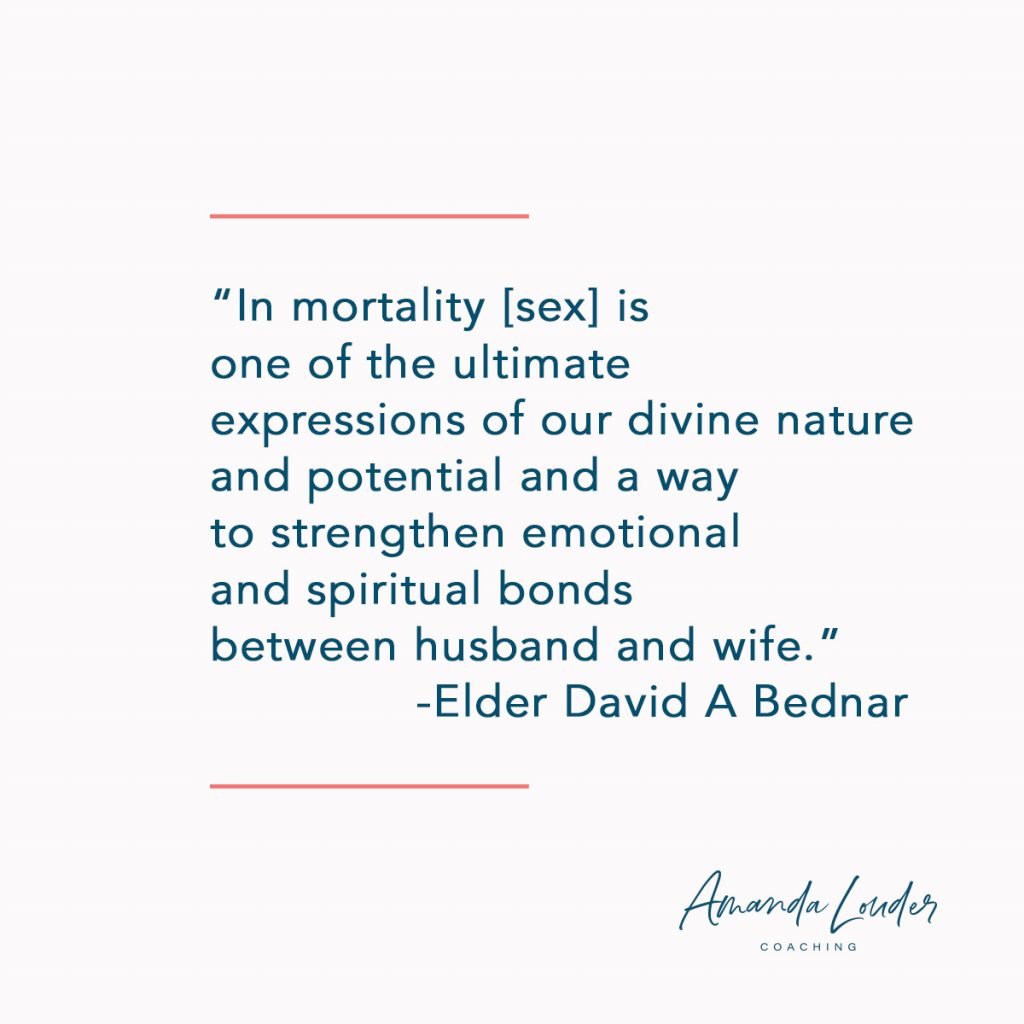
We have all read those scriptures that tell us that thinking about sex is bad. But, what if we’re interpreting those scriptures wrong? In this episode, we explore what those scriptures actually mean and what that means for us and our fantasies. We all have them and that’s ok. Don’t fight against your fantasies! It’s the intention that matters!




Show Notes:
Follow Amanda on Facebook and Instagram.
Join Amanda’s Private Facebook Group.
References for this episode:
How, When, and Why: Talking to Your Children about Sexuality
Show Summary:
We’ve all read the scriptures that we believe tell us not to think about sex…
Matthew 5:28 – Whosoever looketh on a woman to lust after her hath committed adultery with her already in his heart
Alma 38:12 – Bridle…your passions, that you may be filled with love.
Mosiah 4:30 – If ye do not watch yourselves, and your thoughts, ye must perish.
The way we think is very powerful. But what if we are wrong about these scriptures? What if we are actually misinterpreting what is being taught to us?
Jason A. Staples Ph.D. is an assistant teaching professor in the Department of Philosophy and Religious Studies at NC State University. He has a great website where he talks a lot about misinterpretations of scripture. (I will link to his essay on Matthew 5:28 in my show notes) I want to briefly go over some of the things that says in his essay.
Dr. Staples says that we misinterpret the meaning of lust. We equate it to absolute evil and to the physical act of sexual sin. We take lust to mean wanting something more than we should in an unhealthy way. How it is actually used in this scripture, lust is equivalent to covet; meaning wanting something that is not yours. We can’t lust after something we already have. He also says that “the concept of ‘lust’ or ‘desire’ (even the sexual variety) is nowhere forbidden in scripture, nor is it equated to sin – only the potential to sin.” But what lust actually means is just a strong, passionate desire. Should we not have a strong passionate desire towards our spouse? Absolutely! Dr. Staples says that this scripture is really about intent.
And I agree with Dr. Staples. It’s not the desiring or the wanting that’s the problem. It’s the intent behind it.
Before we are married, that wanting and desiring, must be bridled in a way that is in alignment with your values. The strong thoughts and feelings were the way that our Heavenly Parents designed our brains and body to work. We think we “shouldn’t” have sexual thoughts, yet we need those thoughts to create the sexual relationship we want.
Laura M. Padilla-Walker Professor, School of Family Life, Brigham Young University said in an article in the August 2020 Ensign “Experiencing sexual feelings and sexual arousal is normal. [We] don’t need to act on those feelings and sensations but instead can be mindful of them. This means noticing sexual feelings but not negatively judging them.”
That quote was directed towards children, but applies to us as adults as well. It is normal (and I would say, even needed and good) to have sexual thoughts. But instead of judging them, use them for what they were always intended. To bring you closer to your spouse.
Elder Bednar said “in mortality [sex] is one of the ultimate expressions of our divine nature and potential and a way of strengthening emotional and spiritual bonds between husband and wife.”
I believe that it is not a problem that we have sexual thoughts and feelings anytime. As Dr. Staples says, it’s our intention behind them.
In a recent session with one of my clients, she expressed sincere distress about fantasizing. It felt wrong to her. Especially what she was fantasizing about. She was afraid that if someone knew what she was thinking about that they would judge her. And they might. But really, she was judging herself and that felt terrible.
We talked a lot in our coaching session about the purpose of fantasizing. Our brains were designed to need fantasy. Everyone has them (whether they acknowledge or explore them or not). And no matter what the fantasy is, it’s completely normal. Because that’s exactly what it is…fantasy. The more we understand our fantasies and normalize them, the less we beat ourselves up for having twisty, sexual, steamy, thoughts.
After conducting a 4,000+ person, 350 question survey in 2018, internationally recognized sex educator Justin Lehmiller, PhD, concluded that there are 7 main fantasy themes.
- Multi-partner sex. Yep, if you are thinking about threesome’s or group sex, you are not alone. This is one of the most common fantasies, for both genders. Why? Because the idea of multiple people wanting to have sex with you is part of the turn on. You’re the star of the show. You are wanted and desired.
- Power, control, or rough sex is the second most common fantasy. Sadism and Masochism (S&M) and bondage, discipline, dominance, and submission (BDSM) are all about consensual exchange of power in a sexual or nonsexual situation. “The idea of being sexually submissive can be arousing to people who are always in control outside of the bedroom,” says Certified Sex Therapist Gigi Engle. “And the idea of being in control can be hot due to the taboo nature of rough sex and [a] sense of authority.” This fantasy can also look like professor/student, boss/employee.
- Novelty, adventure, and variety. Sex on a beach or in a remote cabin in the woods. Or maybe it’s trying a new toy. The feeling of facing the unknown and trying something for the first time can be an adrenaline rush. Novelty is paramount for keeping long-term relationships alive.
- Non-monogamy. Open relationships, polyamory, and swinging can be quite fun to think about. This isn’t about having an affair, but having consensual non-monogamy. Whether it’s just you participating, just your spouse, or the both of you.
- Taboo and forbidden sex. We want what we can’t have. It’s the way the brain works. So having sex where you could get in trouble or where it’s seen as forbidden in real life can be a turn on. Maybe it’s voyeurism and watching people having sex without their knowledge or consent. Maybe it’s exhibitionism.
- Passion and romance. Turns out that long walks on the beach, candlelit dinners, and eye contact during love making aren’t just romantic hyperbole. They’re all part of the fantasy of being desired, intimate, and romantic. These things make us feel significant to our spouse.
- Erotic Flexibility. There are two main categories with this one.
- Gender bending fantasies – in which someone explores their own gender presentation and dress, or has a partner who does.
- Sexual fluidity fantasies – in which the featured acts or characters are seemingly inconsistent with how one identifies sexually.
What makes this one so appealing is that you get to explore and play different roles and personas that could be really fun, creative, and freeing. It helps us tap into a part of ourselves that doesn’t get out often. It also helps subvert cultural expectations of what you’re “supposed” to be or do. Being able to do or be what and who you’re not supposed to do or be with your partner creates a level of safety and vulnerability that can further connect us with our partner.
Now, those are the 7 most common fantasies. But every fantasy can fall into 1 of 3 categories:
- Those that we keep to ourselves
- Those we share with our partners to turn up the heat during sex
- Those we want to try in real life.
It’s a fantasy. It doesn’t mean that you have any intention of ever acting on it, unless you want to. There are fantasies that can just be thought about, to turn up the heat for your own arousal. There are ones that can totally be acted out within your value system and marriage and it’s great. And then there are the ones that you don’t act on. Again, what is your intention when you are thinking about it? It always comes back to intention. What is the intention behind the thoughts and fantasy? Is it to go out and play out this fantasy even if it goes against who you truly are, and what you truly want? No! Your intention is to use it to increase your arousal, and you are directing that energy to create a wonderful, beautiful experience between you and your spouse.
Intention is the key. Examining your intentions behind things matter. Your intentions around your thoughts, feelings, and actions very much matter in your sexual relationship. Are they there for your own personal gratification? Are they there without caring about your partners wants and needs? Or is your intention to create a great experience for you and your spouse? To show them how much you love them? To use your bodies to create pleasure for each other to help you create physical, emotional, and spiritual bonds?
So, if you are thinking “I shouldn’t fantasize” or “I shouldn’t be thinking sexual thoughts” could you be wrong about that? Could that be exactly what you should be doing in order to help you have a great sexual relationship? I think you should, as long as the intention behind them is good.
Earlier I mentioned Alma 38:12 – Bridle…your passions, that you may be filled with love. I also said that you must bridle your thoughts, feelings, and actions in a way that is in alignment with your values. This is another important scripture and concept that gets misinterpreted.
Often, when we talk about bridling our passions, we think we need to reign it in. We think that to bridle them means to suppress or eliminate them. But that is not what it means. Passions are not necessarily bad or evil. To bridle your passions is to harness, channel, and focus them. Why? Because “disciplining our passions makes possible a richer, deeper love.” (Bridle All Your Passions, Ensign February 1994) We bridle our “passions and seek virtue not because [sex] is bad, but precisely because it is so good. It is not only good; it is pure, precious, even sacred and holy.” So let’s bridle our thoughts. Harness them. Direct them to where they need to go to create an amazing and pleasurable sexual experience for both partners.
Matthew 6:21 says “For where your treasure is, there will your heart be also.” Is your heart and your intention with your spouse? With your marriage? Then let your thoughts go to places that you need to go to in your mind to create that amazing marriage you truly want. The intention, the heart behind it truly matters and will keep you going in the direction you want to go if you focus on that.
I know that it might be hard to start thinking about things differently. To start thinking about fantasizing and sex in a way that you have suppressed for so long. But that is one of the great things about my coaching program. I teach you how to start building those new belief systems step by step, in a way that is true and authentic to you. Ones that empower you to create the life and the sexual relationship you truly want. If you didn’t know, I am still offering a free consultation to anyone interested in joining my coaching program. You can sign up for it on the homepage of my website.



